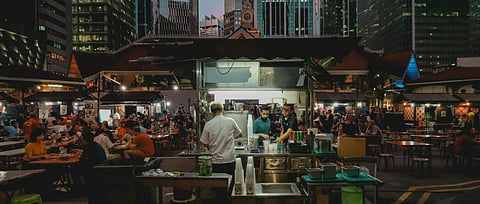
- NEWS
- the EDIT
- COMMENTARY
- BUSINESS
- LIFE
- SHOW
- ACTION
- GLOBAL GOALS
- SNAPS
- DYARYO TIRADA
- MORE

Swing that skillet I grant you, and argue your case against chewing gum in Singapore:
“Simply being offended doesn’t prove a thing.”
“Just because it’s law isn’t proof of what is right.”
You’ll still land on Singapore’s bad side, pay a hefty fine, serve jail time, and be castigated as an abomination for a brief lapse in judgment.
Smoking, spitting in public, littering and jaywalking are commonly not against an image in a tourist’s mind.
Use firearms, you’re flatline.
Trafficking drugs is a route to a death sentence.
But not flushing the toilet and walking around naked?
“Who enforces these things?” even the locals are perplexed, if at all one can’t simply keep tabs on a rather negligible act you make as a matter of habit in the comfort of your own garage, your quaint hotel room, your corner office.
Police presence is rare, but Singaporeans abide by what outsiders shrug off as “slight laws” anyway.
Discipline is the rock on which the entire country was built, where there’s nary a smattering of grime or any visible gunk glistening on pavements and restaurant floors you’ll see in countries like China.
The bigger scheme in the strict implementation of local laws won the significant vote of investor confidence that made a nation in a relatively small span of 60 years.
If the blanket label is asserted against misdemeanors that merit serious reprisal, even more draconian punishments meted out on criminal offenses reassures a carefree walk in the wee hours in the sleepy parts of a city that retires early.
Crossing the streets feels like crossing a line: You hesitate even when nobody is around or looking.
Cruising into the night around Orchard Road, on a roomy and comfortable taxi ride that sailed without the need to change lanes or being once marooned in tolerable traffic, it’s easy to get drawn to an illustration of the city by a local who returned from Britain.
“You know the crime rate in Singapore?”
“Non-existent. It’s not even a joke; it’s real. Let’s say you go out. Wherever you go, a mall or restaurants or hawker centers by the streets, you just leave your bag or your phone on the table and no one is going to steal it. It’s how you reserve tables [here].”
“It must be true even when there are so many Filipinos in Singapore,” a friend said. “Filipinos are more disciplined in another country.”
Indonesian President Joko Widodo spoke about Indonesians visiting Singapore the same way:
“It’s about the system. Look at Singapore. Many of our people are there. They are also good, they behave.”
Several insights rag into Filipino discipline on Reddit:
“We have clean homes but dirty communities”
“In gentrified areas like BGC and Rockwell, people are disciplined because the rules are enforced.”
“Filipinos do what they see. If they see an organized queue, they fall in properly. If they see chaos, they follow chaos.”
In Japan, when a pedestrian has to cross, he has to step out of the curb onto a marking and wait for the traffic to give way. Then he proceeds with a hand raised until making it to the other side, a bow of gratitude toward the drivers.
In the Philippines, jaywalking in groups is people power, especially if it happens on Edsa. You can almost sideswipe a man darting across a highway, who spurns you with a middle finger to brandish his “right of way.”
In public toilets, the want of courtesy is unmatched.
You can’t count on users to maintain some shopping-mall latrines, pigsties with small pools on the floor reeking of urine.
Everybody partakes in the habit and contributes a share.
Taking a small pee stop when you travel far across the country, it’s common to happen upon king-size, Grade-A turds as big as burritos.
Going in various shapes and sizes, and in different stages of disintegration — mushy against visible solids — you conclude it’s a team effort of people who come and go, a potty potluck so to speak.
These thugs and their thug lives!
It’s not a surprise, unless the pot is covered, an imaginary note saying: “Love, the Philippines.”
